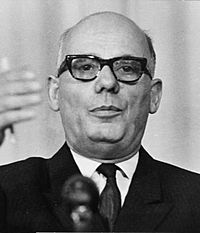Waldeck Rochet facts for kids
Quick facts for kids
Waldeck Rochet
|
|
|---|---|

Waldeck Rochet in 1968
|
|
| Deputy of the National Assembly | |
| In office October 21, 1945 – April 1, 1973 |
|
| In office May 3, 1936 – January 21, 1940 |
|
| General Secretary of the Communist Party of France | |
| In office 1964–1972 |
|
| Preceded by | Maurice Thorez |
| Succeeded by | Georges Marchais |
| Personal details | |
| Born | April 5, 1905 Sainte-Croix, France |
| Died | February 17, 1983 (aged 77) Nanterre, Paris, France |
| Resting place | Père Lachaise Cemetery, Paris |
| Political party | Communist Party of France (1923-) |
| Military service | |
| Allegiance | |
| Branch/service | Free French Forces French Army |
| Years of service | 1943-1945 (Free France) 1926-1927 (France) |
| Battles/wars | |
Waldeck Rochet (born April 5, 1905 – died February 17, 1983) was an important French politician. He was a leader of the French Communist Party (PCF) and served as its General Secretary from 1964 to 1972.
Contents
Early Life and Political Start
Waldeck Rochet was born on April 5, 1905. His father was a cobbler, someone who makes and repairs shoes. Waldeck was named after a famous politician, Pierre Waldeck-Rousseau.
After finishing his time in the army, Rochet worked in market gardening, which means growing vegetables and fruits for sale. In 1923, he joined the youth group of the French Communist Party (PCF). The next year, he became a full member of the party.
Training and First Political Role
Rochet was sent to the Soviet Union for special political training. He studied at the International Lenin School in Moscow. When he returned to France, he became a local party secretary in Lyon. Later, he joined the main leadership in Paris.
From 1936 to 1940, Waldeck Rochet was a communist representative. He was elected to the lower house of the French government, similar to today's French National Assembly. During these years, he also started and edited a newspaper called La Terre. This newspaper focused on agricultural topics.
World War II and Resistance
The leader of the Communist Party, Maurice Thorez, put Rochet in charge of farming matters. Rochet worked to make sure that farmers and city people within the party worked together.
In 1939, Rochet and other party leaders did not speak out against a treaty between Germany and the Soviet Union. This decision made them go against French law. Rochet was held in Algeria, which was a French colony at the time. After Germany invaded France in 1940, he was held by the Vichy France government. He was set free by the Allied forces during the North African Campaign.
In 1943, Rochet joined the Free French Forces. These were French soldiers and citizens who continued to fight against Germany. He represented the communists in London and was elected to a temporary government group in Algiers. In late 1944, after Paris was freed, Waldeck Rochet returned to the city. He continued his work as a representative there.
After World War II: A Leading Politician
In 1945, Waldeck Rochet became a member of the Politburo, a very important group within the Communist Party. He was elected as a deputy for Saône-et-Loire. He served in the National Assembly until 1958.
From 1958 onwards, Rochet was elected in other areas of France. He was the head of the Assembly's agriculture committee. He also led the group of communist members in parliament.
Rising Through the Ranks
Over the years, Rochet became the third most important person in the Communist Party. He was behind only Thorez and Jacques Duclos. In 1961, he became a deputy general secretary. Then, in 1964, he became the main leader of the PCF.
Waldeck Rochet believed in cooperation between different left-wing political groups. In the 1965 presidential elections, he encouraged PCF members to vote for François Mitterrand.
Challenges as General Secretary
As General Secretary, Rochet faced a big challenge. He needed to make the Communist Party more modern. At the same time, he had to keep its traditional ideas based on Marxism-Leninism.
In 1968, there were big protests and strikes in France, known as May 1968. Rochet publicly said he did not support these movements. Later that year, he had to deal with the Soviet Union's actions in Czechoslovakia, known as the Prague Spring. This event caused a lot of stress for Rochet and affected his health.
In 1970, Rochet became too ill to continue his duties. Georges Marchais took over as the party leader. Rochet remained National Secretary until 1972. He was then an honorary president until 1979. Waldeck Rochet passed away in Paris in 1983.
See also
 In Spanish: Waldeck Rochet para niños
In Spanish: Waldeck Rochet para niños
 | Sharif Bey |
 | Hale Woodruff |
 | Richmond Barthé |
 | Purvis Young |

